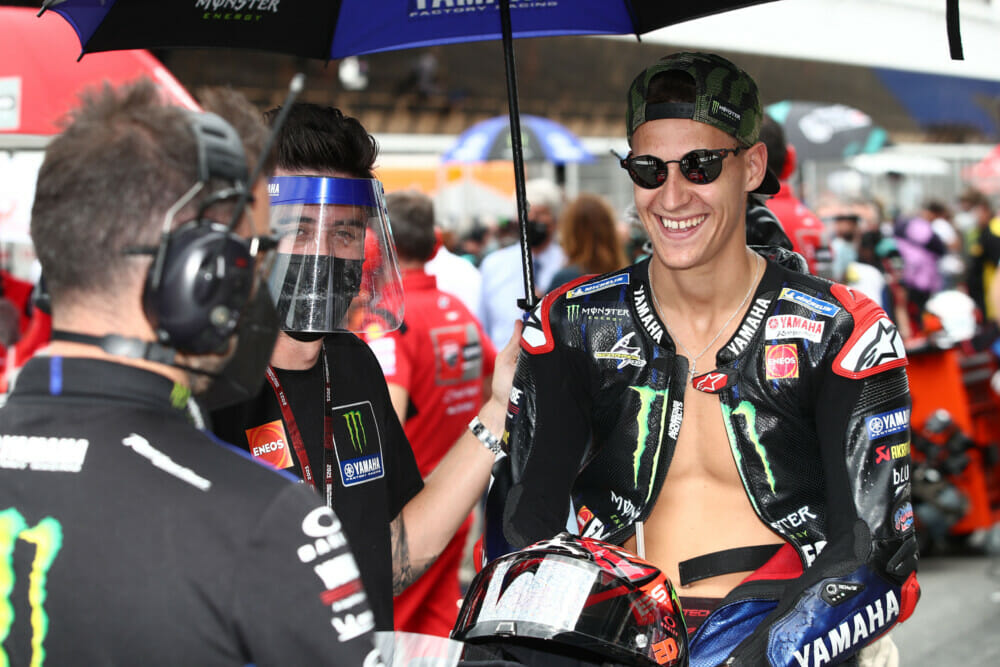Michael Scott | June 22, 2021
Cycle News In The Paddock
COLUMN
Zipgate and Its Deeper Implications
There are various different ways that a rider’s championship challenge can come undone. Seldom is it literally so.
It is obviously far too early to say that Fabio Quartararo’s Catalunya wardrobe malfunction, which ultimately dropped him from a potential 25 points and fourth win of the year to a mere 10-point sixth-place finish, will be anything more than a temporary blip on a so-far very convincing progress. But stranger things have happened.
 Quartararo, here with his suit unzipped in a much more relaxed way on the grid, was lucky to escape a black flag in the race when his suit zipper blew open.
Quartararo, here with his suit unzipped in a much more relaxed way on the grid, was lucky to escape a black flag in the race when his suit zipper blew open.
The dust may have settled since the event, but there has at the time of writing been no really plausible explanation of Zipgate: the mysterious unraveling of the front fastening of his leathers that led to his downfall.
What we do know is that he has proclaimed his own innocence. Alpinestars likewise affirmed “no malfunction” with the zipper. But something definitely caused his zipper to come undone, and for him then to remove the padded chest protector (held in only by the leathers, with no other fastening), and then finish the remaining couple of laps with his suit fully open to the waist, having apparently resisted his attempts to do it up again.
More mysteriously still, after the flag, he was able to do it all up again.
All very odd. After all, zips can split apart under stress, or come undone from the bottom. But unzipping themselves like that? That’s something nobody inside racing could remember. Even outside racing. If not, men would hardly be able to walk down the street with confidence, without having to check their trousers every couple of steps.
Fabio’s discombobulation cost him more than just his dignity. He was docked three seconds for running wide during his clothing confusion and rejoining without losing the requisite position, then later another three seconds for infringing the rule that states very clearly that protective clothing must be correctly fastened at all times on the track.
It also cost him his equanimity, castigating fellow riders who exulted in his punishment by posting a message that “at least we can see their true faces.” Don’t expect him and Jack Miller (to mention just one) to be exchanging Christmas gifts this year.
A week later in Germany, he was more philosophical, able to see the funny side. But his dismay at the time, and his resentment at extra punishment for misfortune that prevented a possible challenge for another win—that was also understandable. After all, as he pointed out, he didn’t do anything to disrupt anyone else’s race (thankfully nobody behind him ran over his discarded chest protector), nor did he endanger anybody, except arguably himself, the road rash, had he fallen off, would not have been pretty.
But rules are rules, and while it is clear that Fabulous Fabio didn’t unzip in order to show off his pecs, even inadvertent transgressions must be punished.
Mustn’t they?
Actually, the question picks at several fresh scabs in other areas, where new regulations and the “rules-are-rules” principle have been causing distress.
One new rule came in last year, that his lap time is canceled if a rider passes a yellow flag, no matter how minor the incident. Previously, this only applied when double yellow flags were waved, signaling a serious incident or track obstruction.
This very frequently causes chaos at the end of qualifying, when riders are going all out, and slip-offs are not uncommon. Many riders resented the loss of latitude, and the intervention of authorities when they were previously allowed to apply their own judgement.
Then the matter of track-limits, now electronically policed. A tiny transgression loses the lap time in practice, while an accumulation of them in a race earns a long-lap penalty. Except on the last lap, when again riders are pushing so hard that inadvertent slip-ups are more than likely. Now, there’s an automatic loss of one position. No judgement on whether or not any advantage was gained. This has cost several podium positions and even race wins in the past couple of years.
And never mind the increasingly ridiculous and perennially unsuccessful attempts to try to stop Moto3 riders from riding slowly in qualifying, waiting for a tow that might gain them more than a second lap-time improvement. Talk about trying to herd cats.
The Stewards Panel, headed by Freddie Spencer, was instituted at the start of 2019, and you would think that the advantage of having such an illustrious leader would be the ability to apply considered judgement, to take matters case by case.
Nobody likes to be punished, but it is easier to accept when there is a reasoned argument behind it.
Sadly, it’s not the case. Whether by choice or design, the panel appears to have taken a jobs-worth role, applying the letter of the law regardless of circumstances. And they gain no respect by doing so. CN
Click here for all the latest MotoGP news.